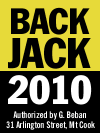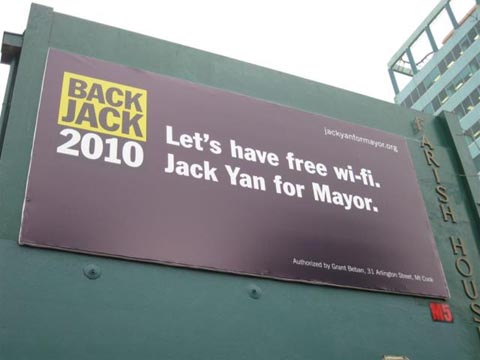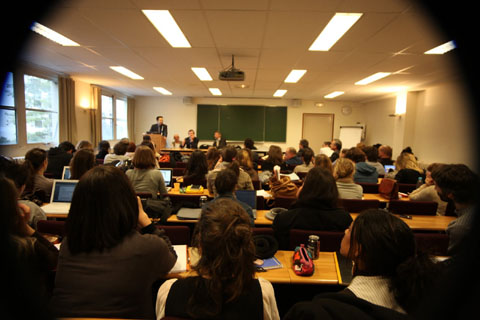 The Fairfax Press has been very interesting in its coverage since the beginning of my mayoral campaign. A Miramar Wharf hotel–training centre development that I pushed for missed any quotes from myself, while today’s announcement of wifi for the waterfront by the incumbent and the Fairfax Press itself again does the same.
The Fairfax Press has been very interesting in its coverage since the beginning of my mayoral campaign. A Miramar Wharf hotel–training centre development that I pushed for missed any quotes from myself, while today’s announcement of wifi for the waterfront by the incumbent and the Fairfax Press itself again does the same.
But, you might be asking, does this change any part of my mayoral strategy? No. We knew there could be the possibility of such a move since April 2010, and it came up in our Vista Group conversations in August as ‘a done deal’.
We simply have to ask one question: does Wellington want a creative mayor, or a reactive mayor?
I know, a few of you cheeky ones will be posing the question back to me since I seem to be reacting to a newspaper article! In my mind I am preempting the questions you may have for me about my campaign.
Let’s say we have wifi: do we want it as part of a political move, or something that has been integrated into a proper technological strategy for Wellington?
Something well thought-out or something done for political reasons?
Looking at the early Tweets, the tech community who would benefit first from such a programme seems to recognize just where the impetus came from.
I consider it a partial victory that this has even come up on the radar at Wakefield Street, because if it were not for my pushing for it since September, I doubt it would even be on the political agenda. Or why Fairfax has kept wifi out of its pages during my campaign till now. The game has changed.
And those of us in the creative community who value originality and a global vision for Wellington won’t want someone who can now be branded a copycat, moving out of desperation.
In 2010, in a decade that is more complex than ever, and where processes and politicking have far less effect than they ever did, will you vote for creative, or reactive?





Press release from WCC – 1 March 2007
Council agrees to broadband vision
Wellington City Councillors have agreed to a vision that could see affordable, high-speed broadband access throughout the city by 2012.
A paper outlining the vision for faster broadband, and a proposal to adopt it and develop a plan to achieve it, was presented to Councillors at today’s Strategy and Policy Committee meeting.
Councillors unanimously agreed to adopt the vision that by 2012, all of Wellington city will have affordable access to an open broadband network with sufficient two-way capacity in the city and out to the world to meet the ongoing information and communication needs of the city’s residents, businesses, investors and institutions. This would improve:
• economic development; employment growth, new business creation, and attracting and retaining businesses
• healthcare; through services such as video nursing
• education; by connecting schools through video conferencing.
• work life balance; as more people can opt to work at home
• energy savings; by linking utility meters through broadband meaning users get information about their energy use
• democracy; by linking communities to City Council hearings and meetings via two-way video
• entertainment options; including high definition TV.
Mayor Kerry Prendergast says the objective is to expand access to affordable, faster broadband for Wellington city residents. “Outside of the Wellington CBD there is limited access to high-speed, cheap broadband. This is extremely frustrating for many businesses and residential customers, many of whom work from home and are trying to compete in a global market.
Mayor Prendergast says the Council will ask potential industry partners to help develop ideas for implementing the vision. “This will determine the most appropriate business model, mix of technologies, technical details and financial options needed to achieve the vision.
“The Council has a key role to play in ensuring Wellington city has the necessary broadband infrastructure to be globally competitive. The Government has identified broadband as a priority with the expectation that each region or city takes the lead,” says Mayor Prendergast.
Mayor Prendergast says the implementation of the broadband network would be done over several years.
The first stage could involve installing a ‘backbone’ of around 100km of fibre across the city (connecting major buildings, libraries, medical centres, schools and major private sector businesses). Once this was in place, extensions could be made from the fibre backbone to every neighbourhood in the city. Indicative costs for these two stages are up to $40m and will depend on the extent to which this network generates revenue from access charges, the possible use of the overhead trolley network and existing ducts, and opportunities for cost savings by using opportunities from other road opening activity.
“These costs are indicative only as several costing options will be explored, including a mix of private/public partnerships and user pays,” says Mayor Prendergast.
“Wellington is already highly connected with 51 percent of the Wellington population having a broadband connection, and with another 37 percent having dial-up access. This provides confidence that the demand for broadband exists to a sufficient scale that the private sector will view broadband in Wellington as a viable and attractive investment.
“Once we have collaborated with potential industry partners, the Council will be in a position to decide what degree of involvement and investment it needs to take.”
A further report on options for implementing the vision will be presented to the Strategy and Policy Committee by June 2007.
For further details please contact:
Sharon Williams, Mayor’s Office, tel 801 3119 or mob 027 223 7133
Michelle Brooker, Council Communications, tel 801 3281 or mob 027 4463929.
Wellington City Council news releases are also available daily as Web Alerts through the Council’s website, http://www.Wellington.govt.nz. To subscribe, select the Web Alerts icon on the home page.
Three things: first, wifi is not mentioned. Secondly, broadband is a no-brainer and should have been one since the 1990s. Thirdly, trotting the wifi programme out at the end of the term when they’ve had three years to move on improving the city’s broadband (based on the date of this release) smacks of desperation.
Wellington can’t afford to have reactive mayors any more, who pay these things lip-service but fail to grasp their importance.
If someone else announces and implements a successful policy for ‘Job Creation’, will you also claim that it’s directly reactive to your campaign?
What’s your priority here, mate? Do you really want the wifi, or do you just want the credit? Do you really think the mayor even knows who you are?
Mandy, I expect fair and honest reporting, and if you pop by to any of the meet-the-candidates sessions, you will be acutely aware that the incumbent knows who I am.
Considering I was the first person the Mayoress ever followed on Twitter, I think that says something.
Credit doesn’t matter—but honesty does. Would you prefer a one-sided story, or one that balances the piece with a fair view? Let’s be frank here: what we saw was an ad in one Fairfax property for another Fairfax property.
And that is precisely the first point of the post: holding a media outlet to account.
I should point out that I am not the first person to think that the incumbent has jumped on to the Back Jack bandwagon. I read some Tweets and Facebook comments, and observed there were people already expressing what I had thought this morning.
But my actual reaction when I was first told: delight. Delight that my ideas had been effectively endorsed by the establishment. I didn’t hatch any of them with some big proprietary stamp, just as Celia hasn’t done so with light rail, and Bryan hasn’t done so with Wellington’s debt problem.
I can hardly be the candidate advocating open source software and then claim a monopoly over an idea!
Hey, I love the fact that TradeMe is probably going to pay for all of this, and that alone saves me headaches. And there’s no reason two services can’t run side by side as we expand the wifi networks in the city. They are not rival programmes, but complementary ones. That’s why I haven’t argued specifics or coverage, though many of my supporters have done that.
Political kleptomania is common, so as long as it’s in the wild, then that’s great—now it’s up to us to steer it in the right direction.
Kris, you are grasping at straws. You and I both understand that job creation is a far wider concept than free wifi. The short answer to your question is, ‘Of course not.’
When you have an incumbent who has repeatedly demonstrated a lack of appreciation for the IT sector (such as the demise of our city’s tech strategy several years ago) and line it up with the usual 20th-century ideas (e.g. her insistence that a second Mt Vic tunnel and widening roads are important), then backing an unintegrated policy is clearly reactive.
Therefore, I stand behind my original post. Let’s look at voting someone who understands the social and commercial implications of this announcement. There are plenty of posts on this subject at this site alone, and voters can decide on who has the creativity to drive this city into the 2010s.